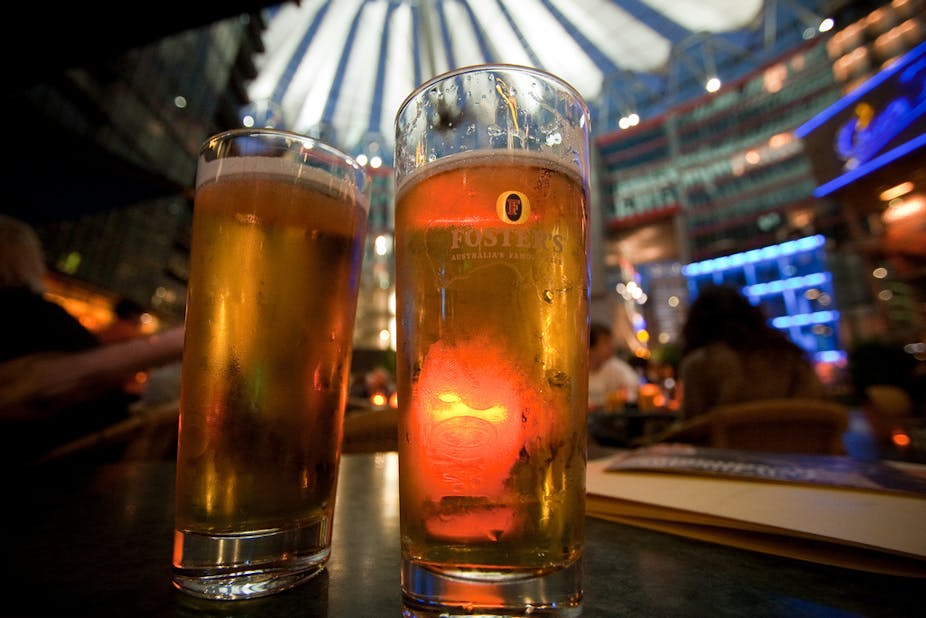Foster’s Group’s acceptance of a $12.3 billion takeover bid from global brewer SABMiller will see the ownership of some of Australia’s most popular beer brands, such as Victoria Bitter and Cascade, fall into foreign hands.
The planned acquisition has provoked strong criticism from anti-foreign ownership campaigners like Dick Smith, who bemoan the loss of Vegemite, Arnott’s, Aeroplane Jelly and other iconic brands to companies based overseas.
But is there any proof that consumers loyal to Foster’s will be put-off by the move? University of New South Wales marketing lecturer Dean Wilkie says SABMiller has little to worry about.
How damaging would a customer backlash be for Foster’s?
When we form an attitude about a brand, it is the sum of the positive things we know about the brand, as well as the negative things.
If we know more positive things about a brand, then our attitude towards it will ultimately be positive.
People who drink Foster’s beers are likely to have a range of positive information, such as the taste of the beer, the experiences they have while drinking it, and the places where they buy it.
So when some negative information comes out, such as that Foster’s is going to be owned by a foreign company, it doesn’t have much of an impact because there is so much existing positive information about the brand.
But when it comes to people who don’t have a strong connection with the brand, a negative piece of information like this can cause a lot more damage.
Many people are saying that this takeover is potentially bad for Foster’s brand, but this isn’t true for people who consume their products regularly and have a strong connection.
The other reason for this is that consumers are becoming used to their favourite brands being bought up by companies from overseas.
We know that Holden is not really an Australian company, we know that Vegemite is foreign-owned – but we still buy their products because the realities of corporate ownership aren’t at the front of our minds.
Because we have become used to it, foreign ownership does not have as big an impact as it would have a few years ago.
Do consumers care whether a product is produced in Australia, or is Australian-owned?
In Foster’s case, there is not even very much of an Australia-wide connection – it’s more of a local connection. Think of Victoria Bitter and Melbourne Bitter, for example.
In essence, as long as they keep brand image the same, then it won’t suffer too much damage.
But if consumers learn that, for example, VB is now being made in China, or they start to tinker with the brand image, then Foster’s will be in trouble.
Take Qantas, which is one of Australia’s most iconic brands, and is planning to expand into Asia. Consumers are beginning to see that the plan could have an impact on Australian jobs, and this is having an impact on the image of the brand.
If SABMiller decides to cut the local workforce or shift some production overseas, then it can probably expect to have a bit of a backlash.
Foster’s has not had much of a growth strategy in recent years. What kind of plans could SABMiller have for the company, in terms of brand development?
Foster’s got into trouble because it has too many beer brands under one banner.
When you have a variety of brands, and yet you use the same sales force, the same senior management, the same advertising agency and the same research agency, and your employees move around those brands quite frequently, the brands often merge into one in the minds of consumers.
The brands start to lose what is distinctive about them because they are relying on the same resources from their parent company.
SABMiller needs to treat these brands as individuals. They need to ensure that consumers see them as individual products at every point.
That is where Foster’s fell over, and it’s where SABMiller needs to succeed.
Isn’t it ironic that the Foster’s-labelled beer is actually unpopular in Australia, and is actually a global brand distributed under licence?
Foster’s has been successful overseas by leveraging associations of what it means to be Australian.
In Europe, where a lot of Foster’s beer is sold, people see the Australian lifestyle as something aspirational – it’s fun, balanced and relaxed.
We tend to take these sorts of associations for granted. When it comes to our brands, we are quite quick to downplay their Australian heritage, when this can actually be of benefit.
Another example is Blackmores vitamins, which is experiencing strong growth in Asia. One of the major reasons they are growing is because they are seen as being distinctly Australia, which in people in Asia associate with high-quality and safety.
Blackmores has successfully leveraged Australia’s identity in its overseas expansion, but other companies tend to downplay this identity.
The irony with Foster’s is that it took an overseas company [Heineken] to build on that brand and export it overseas. [Heineken makes and sells Foster’s in Europe under a licensing agreement.]

